Archives
-
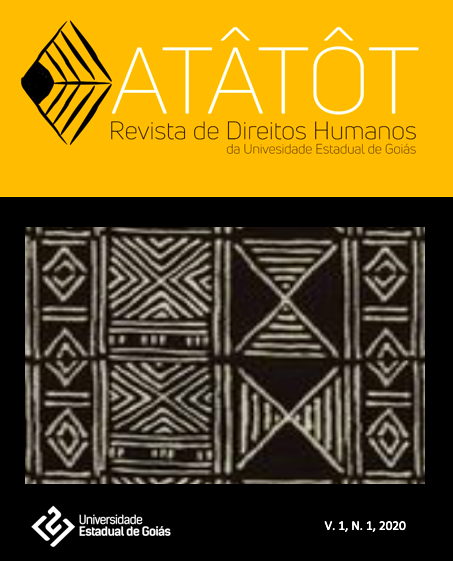
jan./jun.(1)
Vol. 1 No. 1 (2020)Atâtôt – Interdisciplinary Journal of Human Rights of UEG is a biannual academic publication under the responsibility of the State University of Goiás. Its goal is to create interdisciplinary spaces for the publication of articles, essays, reviews, and other academic texts on the general theme of human rights, focusing on topics related to democracy, constitutional issues, and social struggles for rights.
In this launch issue, Atâtôt – Interdisciplinary Journal of Human Rights from UEG presents discussions on human rights from a critical perspective, bringing various viewpoints on the importance of social and political struggles for the realization of human rights in Brazil, Argentina, Mexico, and Italy.
The first article, "Dilemmas of Peace and Justice in Mexico in Times of Crisis of Democracy and Human Rights", by Prof. Dr. Rebecka Villanueva Ulfgard (Mora Institute, Mexico), reflects on the dilemmas of peace and justice in Latin America, currently in a crisis of democracy, in light of Sustainable Development Goal 16 (SDG 16). It carries out a critical analysis of some of the challenges present in the region that face the norms and principles underlying SDG 16, emphasizing, for this purpose, the case of Mexico through two cases that marked the country with respect to the struggle for justice for victims of violence; Ayotzinapa and Tlatlaya.
The second article, “Are Civil Society Organizations Accountable to their Beneficiaries? A Multiple Case Study Analysis on Italy”, by Prof. Dr. Domenico Carolei (University of Stirling, UK), investigates to what extent different types of civil society organizations (CSOs) practice the accountability of beneficiaries (transparency, participation and complaints procedure) within their own structure. It focuses the analysis on Italian CSOs.
The third article, "The role of Civil Society Organizations in the Fight for Human Rights and Democracy in Mexico", by Prof. Dr. Pablo Romo Cedano (UNAM, Mexico), analyzes the evolution of organizations specialized in human rights in civil society in Mexico, and argues that its growth and professionalization were achieved due to the great social movements that generated processes of great change in the country.
The fourth article, "Follow-up over Indigenous Lands in Pernambuco, Brazil: a diagnosis of the right to property of indigenous peoples", by Prof. Me. Luis Emmanuel Barbosa da Cunha (UFPE, Brazil) and Prof. Me. Jerfferson Amorim (Unicap-PE, Brazil), presents partial results of the monitoring project on the demarcation of indigenous lands in the State of Pernambuco, in order to evaluate the realization of the right to communal property and learn how the fundamental rights of indigenous peoples take place in Brazil.
The fifth article, "The Obstacles to the Identity Construction of Afro-descendants in the Brazilian Context", by the master student Sara Eugênia França (PPGIDH/NDH-UFG), discusses black identity and argues that its construction requires greater effort due to the negative reflections of slavery and structural racism that hinders the construction of an identity based on positive premises in Brazil.
The sixth article, "Reflections on a Concept of Human Dignity ", by the master student Ana Paula de Castro Neves (PPGIDH / NDH-UFG) and by Prof. Dr. Angelita Pereira de Lima (PPGIDH/NDH-UFG), addresses some reflections on a conception of human dignity, highlighting its fundamental value to human rights. In order to demonstrate the dimension of the principle of human dignity as an intrinsic value for all human beings, inserted in the nucleus of the fundamental rights of the Brazilian State.
Finally, there are two monographic works.
The first, "Women’s Struggles for the Decriminalization of Abortion in Brazil and Argentina", by master student Ana Karoline Dirino (PPGIDH/NDH-UFG), analyzes from a political point of view how disputes (struggles) have developed in the legal and social environment, as well as examines the strategies that have been adopted by feminist movements and by groups opposed to the decriminalization of abortion in Brazil and Argentina.
The second, "The Tax Benefits: Myths and Truths", by the Master and Fiscal Auditor of the Revenue of the State of Goiás, Cláudio Gonçalves Pacheco, verifies the myths and truths about the fiscal benefits from a human rights perspective, considering the practical repercussions of tax expenditures, especially in its much-appreciated socio-economic return, and the prospects of compromising the equitable allocation of tax revenues.
-
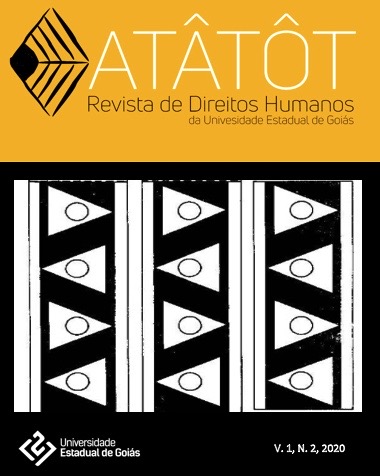
jul./dez.(2)
Vol. 1 No. 2 (2020)Atâtôt, the Interdisciplinary Journal of Human Rights of UEG, is a biannual academic publication under the responsibility of the State University of Goiás. Its goal is to create interdisciplinary spaces for the publication of articles, essays, reviews, and other academic texts on the general theme of human rights, focusing on topics related to democracy, constitutional issues, and social struggles for rights.
In its second issue, Atâtôt: Interdisciplinary Journal of Human Rights from UEG presents discussions on human rights from a critical perspective, bringing various views on the importance of social and political struggles for the realization of human rights in Brazil, Kurdistan, England, Syria, and Turkey.
The first article, “Conflicting Views of the Political Community in the Middle East: the Kurdish Model as an Alternative to Theocracy and Nationalism”, by Prof. Dr. Hanifi Baris (University of Aberdeen, Scotland), reflects on democratic confederalism and the political community model developed by the dominant Kurdish political movements in North and West Kurdistan (Turkey and Syria) in the face of existing political institutions in Turkey and in Syria in particular and the Middle East in general.
The second article, “Jurisdiction to Sue a Parent Company in the English Courts for the Actions of its Foreign Subsidiary: Vedanta v Lungowe and Post-Brexit Implications”, by Prof. Dr. Mukarrum Ahmed (Lancaster University, England), examines private international law and substantive liability issues in proceedings against a UK-based parent company in the face of human rights violations by actions of foreign subsidiaries, addressing, to that end, the historic Vedanta v Lungowe ruling by the UK Supreme Court.
The third article, “The Legacy of Transitional Justice in Brazil: Experiences and Challenges”, by Prof. Me. Luis Emmanuel Barbosa da Cunha (UFPE, Brazil) and Prof. Me. Manoel Moraes (UNICAP/PE, Brazil), taking as a starting point the Security Council Resolution S/2004/616 on the Rule of Law and Transitional Justice in post-conflict societies and the international doctrinal construction of the Center for Transitional Justice (ICTJ), addresses how transitional justice becomes concrete and accessible in the city of Recife/PE.
The fourth article, “Constitutionalism as a Void Signifier at the Outskirts of World Society: What can the category “State terrorism” say about global constitutionalism?”, by the PhD student in Political Science Maria Eduarda Borba Dantas (UnB, Brazil), analyzes the concept of “State terrorism” to counterpoint the hegemonic debate about transnational forms of constitutionalization and, thus, develop the category “peripheral constitutionalism”.
The fifth article, “From the Slave Stories to Quilombos in Brazil and the Recognition of the Remnants by the Brazilian Supreme Court”, by Prof. Me. Áurea Bezerra de Meedeiros (IESB, Brazil) and Prof. Dr. Menelick de Carvalho Neto (UnB, Brazil), starting from a critical analysis of slavery in Brazil, portrays the struggles of the black people in search of their rights as a person, as an individual, in a context of structural racism.
The sixth article, “Necropolitical Education: Authoritarian Personality, Violence and Schooling of Poor Young People in Brazil”, by Prof. Dr. Eguimar Felício Chaveiro (IESA-UFG, Brazil) and Prof. Dr. Rosivaldo Pereira de Almeida (UEG, Brazil), addresses the educational dimension and the necrophilic character of the wreckage and capture of the subjectivities present in the schooling processes, dialoguing, for that, with Mbembe (2012), Adorno (1951), Rolnik ( 2018) and Bourdieu (1998).
The seventh article, “The Invisibility of Women in Street Situation and the Relativity of their Rights”, by Prof. Me. Thiago Henrique Costa Silva (UNIALFA, Brazil), Prof. Me. Luciana Ramos Jordão (UEG, Brazil) and lawyer Patrícia Leão Ferreira (UNIALFA, Brazil), examines the living conditions of women living on the streets and the relativization of their rights from a perspective of the law found on the street.
The eighth article, “Freedom of Speech, Media and Tolerance”, by the PhD student in Human Rights Rakell Dhamarys Moreira (PPGIDH/UFG, Brazil), by Prof. Dr. Angelita Pereira de Lima (PPGIDH/UFG, Brazil), and the MD student in Human Rights Ana Paula de Castro Neves (PPGIDH/UFG, Brazil) discusses how freedom of expression, constitutionally guaranteed from a liberal perspective, is intolerant whenever it excludes the other's speech, thereby reinforcing the hegemonic discourse.
Finally, there are two monographic works.
The first, “What is Truth?”, by the MD and Tax Auditor of Goiás State Revenue Cláudio Gonçalves Pacheco, reflects on the concepts of truth and their implications for Law, for the materialization of human rights, as well as for human rights related to social justice and tax justice, dialoguing, for this purpose, with Ronald Dworkin and Michel Foucault
The second, “Towards a Practical Centrality of Human Rights: Primacy for the Dignities of Humans in the Prison System”, by Prof. Me. Philipe Anatole G. Tolentino (Faculty Sensu, PPGIDH/UFG, Brazil), addresses the tension between the theoretical plan and the plan for the implementation of fundamental human rights, with the Prison System as a background, and the human rights theory as the central basis.
-
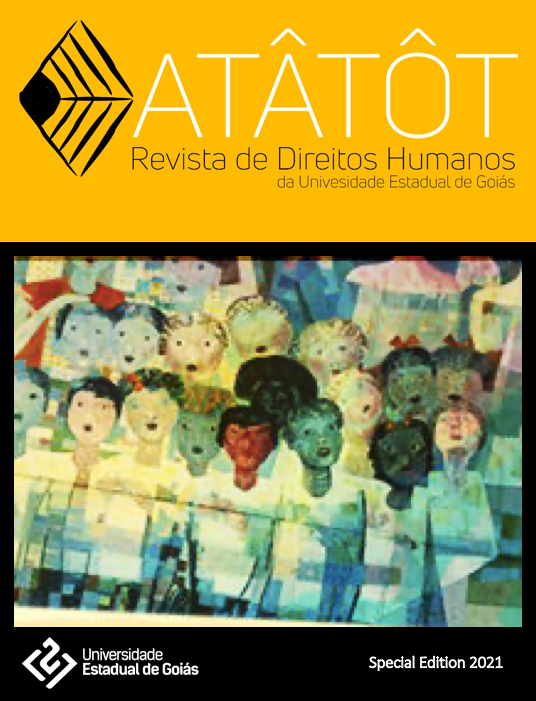
Special Edition: June 2021
Vol. 2 No. 1 (2021)Atâtôt, the Interdisciplinary Journal of Human Rights of UEG, is a biannual academic publication under the responsibility of the State University of Goiás. Its goal is to create interdisciplinary spaces for the publication of articles, essays, reviews, and other academic texts on the general theme of human rights, focusing on topics related to democracy, constitutional issues, and social struggles for rights.
In its special edition of June 2021, Atâtôt: Interdisciplinary Journal of Human Rights from UEG presents discussions initially developed at the international seminar "X Thinking Human Rights," held by the Interdisciplinary Center for Studies and Research in Human Rights of the Interdisciplinary Graduate Program in Human Rights at the Federal University of Goiás in November 2019.
In this sense, Atâtôt, the Interdisciplinary Journal of Human Rights from UEG, provides, in its special edition of June 2021, discussions on human rights from a critical perspective, bringing insights on the importance of resistance to neofascist threats and Bolsonaro's authoritarianism, the essential relationship between memory and human rights, the right to food in Argentina, the effective protection of human rights defenders, effective strategies to ensure human rights in times of neofascism, and the current quality of Brazilian democracy.
The first article, “Memory and its Relations with Cronos and Kariós”, by Prof. Dr. Solon Eduardo Annes Viola (UNISINO, Brazil) and Prof. Dr. Paulo Peixoto de Albuquerque (UFRGS, Brazil), analyzes the living and constant relationship between memory and the experience of the present, taking care to bring memory, truth and justice closer to contemporary human rights assumptions.
The second article, “The Right to Food in Tension with Collective Food Actions: The Case of Córdoba (Argentina) at the Beginning of the 21th Century”, by Prof. Dr. Martín Eynard (Universidad Nacional de Córdoba, Argentina), analyzes the characteristics of collective food actions in the city of Córdoba (Argentina) between 2001 and 2007, in order to stress these conflicts with the right to food, considering Latin American contexts from a sociological perspective.
The third article, “Human Rights Defenders and Networks for their Protection: A Response to Repressive Environments”, by Protection International's Head of Policy, Research and Training, Mauricio Angels (PI, Brussels), examines human rights protection systems to argue that the centrality of the State and individual protective measures are not sufficient to guarantee the physical and psychological integrity of human rights defenders. This is because Protection International's practical experience has shown that human rights defenders should be assumed as beings immersed in the struggles of their communities, in their relationship with other social and political actors, and in their interaction with territories, in the resistance to repressive and violent environments.
The fourth article, “Strategies to Guaranteeing Human Rights in Times of Fascist Threats”, by Prof. Dr. Pablo Romo Cedano (UNAM, Mexico), examines some of the most effective strategies to ensure the respect and promotion of human rights in the face of neo-fascism and democratic authoritarianism that present themselves, for example, in the Brazilian case.
Finally, the fifth article, “Democracy in Brazil and its Implications for Human Rights”, by Prof. Dr. Carlos Ugo Santander (PPGIDH/UFG, Brazil) and PhD students Carolina Hissa (PPGIDH/UFG, Brazil), Vanessa Coelho Guimarães (PPGIDH/UFG, Brazil) and Aletheia Woyames (PPGIDH/UFG, Brazil), explores, from the quality of democracy’s methodological theoretical framework perspective, the recent evolution regarding human rights, disputes, challenges and prospects from the political context of the government of President Jair Bolsonaro in Brazil.
-
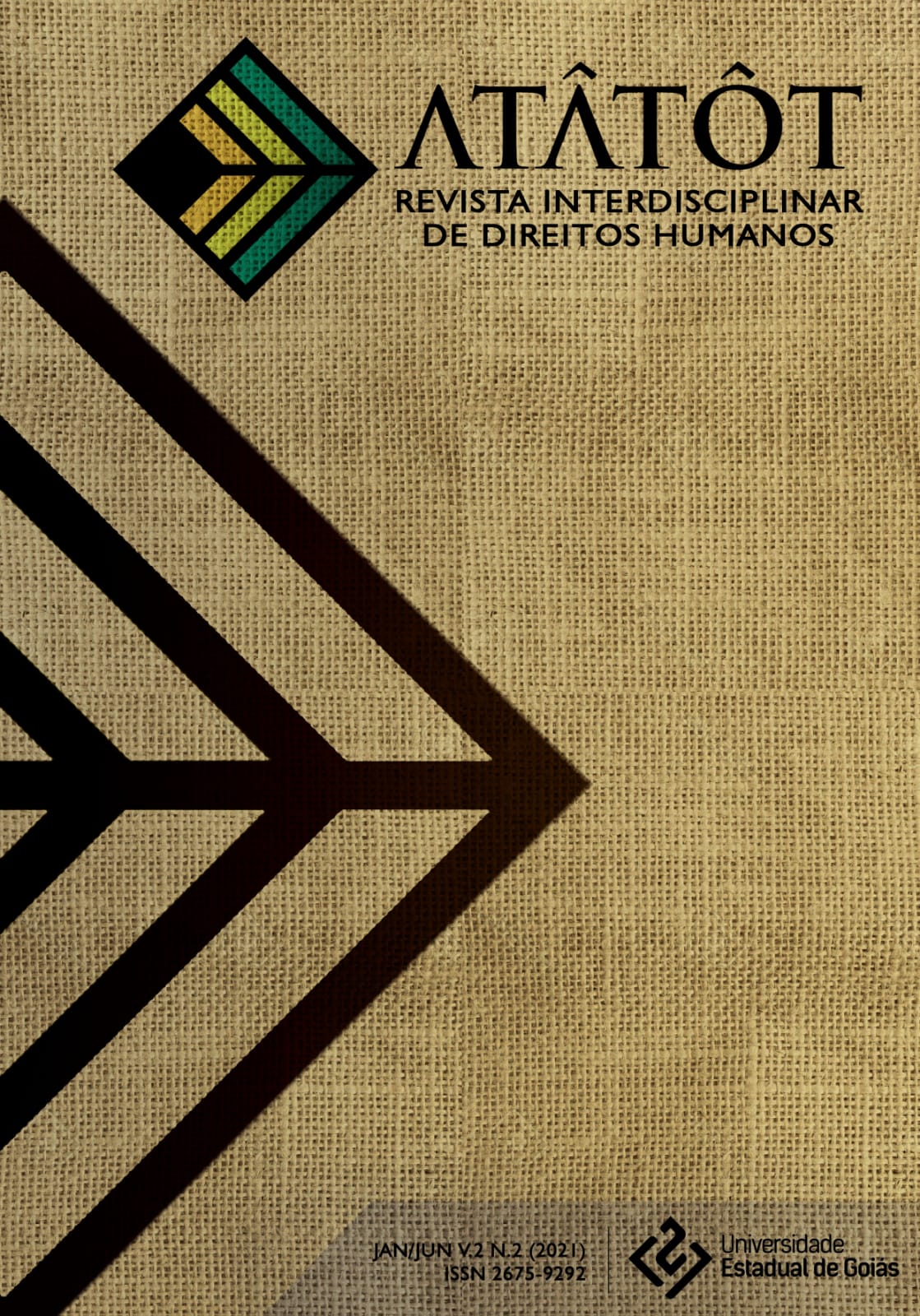
jan./jun.(2)
Vol. 2 No. 2 (2021)Atâtôt, the Interdisciplinary Journal of Human Rights of UEG, is an academic publication, open access, peer-reviewed, and published biannually by the State University of Goiás, Central Campus, in Anápolis, GO. Its goal is to create interdisciplinary spaces for the publication of articles, essays, reviews, and other academic texts on the general theme of human rights, focusing on topics related to democracy, constitutional issues, and social struggles for rights.
In its second edition from June 2021, Atâtôt—the Interdisciplinary Journal of Human Rights from UEG—presents discussions on human rights from a critical perspective, bringing insights on the right to have rights of the Romani people, International Criminal Law, the modern social contract, the interdependence of human rights, structural violence of penal control, social justice under Hayek, and the right to health.
The first article, “Including Citizens Who Don't 'Fit': On Some Contradictions of Liberal Anti-Discrimination Discourses”, by Prof. Dr. Juliane Solf (University of Hildersheim, Germany) and Dr. Marek Szilvasi (Independent Researcher, Germany), analyzes the inclusive dimensions of the liberal tradition of anti-discrimination that is based on strengthening civil and political liberties and on neutral public institutions, where each member of society is relevant as bearer of rights and duties under the aegis of the Democratic Rule of Law, to argue that the contradiction between these liberal institutions based on citizenship and the market gradually corrupts the process of equalizing rights holders and results in the romani people being pushed further to the margins of society.
The second article, “International Criminal Law in Defense of Human Rights: Looking Again at the Tip of the Iceberg”, by Prof. Dr. Luis Emmanuel Barbosa da Cunha (PPGD-UFPE), reflects on the role of International Criminal Law and the International Criminal Court in the promotion and protection of human rights.
The third article, “For an Interdisciplinary Approach to the Modern Social Contract: Fiscal Policies, Racial Inequalities and Human Rights”, by Prof. MD. Flavio Batista do Nascimento (Sensu College) and Prof. MD. Philipe Anatole Gonçalves Tolentino (Law/Sensu College), identifies how race and fiscal policies touch the aspect of the materialization of human rights and racial inequalities in the modern social contract.
The fourth article, “Interdependence of Human Rights and the Right to Public Health in Brazil”, by Prof. MD. Carolina Lima Gonçalves (Sensu College), investigates to what extent the recognition of the interdependence between human rights impacts the realization of the right to public health in Brazil.
The fifth article, “Right and Exception: The Structural Violence of Criminal Control”, by Prof. MD. Antônio Leonardo Amorim (UFJ and UNEMAT) and the Law student André Luiz de Resende Júnior (UFJ) seeks, from a perspective of the political economy of the penalty, to show an operationalization of the modes of penal control in the center and in the margins of the capital.
The sixth article, “Social Justice from Hayek's Perspective”, by Profa. MD. Ana Paula de Castro Neves (doctoral student at PPGIDH-UFG), by Prof. MD. Luciano Rodrigues Castro (doctoral student at PPGIDH-UFG) and Prof. Dr. Wagner de Campos Sanz (Faculty of Philosophy/UFG), develops a study of Friedrich August von Hayek's critical approach, from the denomination to the application of Social Justice.
The seventh article, “Fundamental Right to Life: Right to Health as a Principle of Human Dignity”, by master's student Rebeca de Magalhães Melo (IESB) and Prof. Dr. Teresinha de Jesus Araújo Magalhães Nogueira (UFPI and UnB), develops a legal analysis of what leads to the right to judicialization of health in Brazil.
Finally, there is a review of Hannah Arendt's book The Origins of Totalitarianism, “Human Rights, Violence and the Camp Paradigm: A Critical Reception Built on “Arendtiana's Work”, by the master's student in human rights Laura Mallman Marcht (UNIJUI).
-

jul./dez.
Vol. 2 No. 3 (2021)Atâtôt, the Interdisciplinary Journal of Human Rights of UEG, is an academic publication, open access, peer-reviewed, and continuously published annually (in various volumes throughout the year) by the State University of Goiás. Its aim is to create interdisciplinary spaces for the publication of articles, essays, reviews, and other academic texts on the general theme of human rights, focusing on topics related to democracy, constitutional issues, and social struggles for rights.
In its third edition from December 2021, Atâtôt: Interdisciplinary Journal of Human Rights from UEG presents discussions on human rights from a critical perspective, reflecting on the inherent debate regarding constitutional effectiveness, international law, agrarian, environmental, and mining law, indigenous and quilombola rights, the relationship between human rights and criminology, and education in human rights.
The first article, “Concepts of quilombola school education in the construction of the municipal curriculum: Some considerations”, by Profa. Dra. Ana Cristina Santos Peixoto (UFSB) and Ma. Sara Alves da Luz Lemos (UFSB), discusses Quilombola School Education as a Modality of Basic Education and its implementation in Municipal Curriculum Reference for Aurelino Leal – BA, addressing their contributions and perspectives, deepening the debate on human rights education, inclusion and recognition.
The second article, “Social protection system and defense of Human and Peoples' Rights in Africa: emergence and perspectives”, by the Researcher and Doctoral Student Augusto Checue Chaimite (UFBA and CEIFA), focuses on the creation of the Organization of African Unity (OAU), analyzing in-depth and critically the system for the protection of human and peoples' rights in Africa, carrying out a historical-juridical incursion on such system.
The third article, “Mass culture, media criminology and the stigmatization of the criminal”, by Ma. Priscila Péclat Gonçalves Teixeira (UFSB), discusses the relationship between media criminology and mass cultures, in to the extent that these occur in the plane of "being" and influence the plane of "should be", reflecting in a search for more and more penalties, more severe punishments and, often, different from legal ones, to those stereotyped as criminals, referring to the cliché that “good crook is dead crook”.
The fourth article, “Out of the closet, within the norms: the world health organization and LGBTQI mental health”, by Profa. Dr. Brenda Thainá Cardoso de Castro (UNAMA) and M. Matheus dos Santos da Silveira (UFPA), analyzes the contributions made by the World Health Organization (WHO) regarding the mental health care of the LGBTQI community, analyzing documents produced by the WHO who assumed responsibility for actions related to LGBTQI mental health.
The fifth article, "The realization of the fundamental right to Health in the light of Proportionality and the Theory of the Reservation of the Possible", by Me. João Felipe da Silva Fleury (IDP), outlines an analysis of the effectiveness of the fundamental right to health in balance with the principle of proportionality and the theory of the reservation of the possible, analyzing the fundamental right to health as a limited right that depends on the allocation of equally limited financial resources by the State.
The sixth article, “The principle of sealing backlash from the perspective of Niklas Luhmann's systems theory”, by Me. Guilherme de Moraes Bittar (UFG and Fibra), provides an overview of the concepts and ideas of Niklas Luhmann's thought, for then to carry out an analysis of the legal institute of the principle of the prohibition of setback from the perspective of Luhmann's systems theory, and, consequently, evaluate the limits and problems related to the factual ballast and the application of this institute against the needs and demands of economic systems , political and moral.
The seventh article, “Homer's Runner Project in Piracanjuba-Goiás: Promotion of human rights”, by Profa. Dr. Daniele Lopes Oliveira (PUC-GO and FAP), presents a multidisciplinary research project that aims to integrate academics, teachers and the community in the municipality of Piracanjuba, a city in the interior of the State of Goiás, which has as its scope education for human rights in Higher Education to intervene in the local reality, proposing more dignified living conditions and acting for education and protection of life and human dignity.
The eighth article, “On accumulation by dispossession and the contradiction of private land ownership: the condition of peasant resistance against violence mediating conflicts”, by MD Sara Macedo de Paula (UFG) and MD Victor Hugo de Santana Agapito (UFG) horizontally investigates the exponents outside accumulation by dispossession, a category constructed from historical-geographic materialism, to analyze how the concentration of land is directly related to the various forms of violence suffered by subjects in this context.
Finally, there is a review of the book If They Let Me Talk by Moema Viezzer, “Let Us Make Them Listen”, written by the PhD student in Human Rights Ana Paula de Castro Neves (UFG) and the Graduates in Journalism Ana Luiza Tanno, Marina Barros Ferreira and Victor M. Weber (UFG).
Anapolis/GO, 29 December 2021.
-

jan./jun.
Vol. 3 No. 1 (2022)Atâtôt – Interdisciplinary Journal of Human Rights of UEG is an academic publication, open access, peer-reviewed, and continuously published annually (various volumes throughout the year) by the State University of Goiás. Its aim is to open interdisciplinary spaces for the publication of articles, essays, reviews, and other academic texts on the general theme of human rights, focusing on issues related to democracy, constitutional matters, and social struggles for rights.
In its first edition from June 2022, Atâtôt – Interdisciplinary Journal of Human Rights from UEG presents discussions on human rights from a critical perspective, reflecting on motherhood and domestic work, journalistic narratives and the blaming of women, the emancipatory rights of Afro-Brazilians, spaces of memory and urban practices, drug use among students in Adult Education, and the rights of indigenous peoples.
The first article, "Maternity and housework: how much is care worth? Analysis from the feminist theory of law", by MD in Agrarian Law Julyana Macedo Rego (UFG), lawyer Sabrinna Orlando Fernandes (FACMAIS) and Professor Helga Maria Martins de Paula (UFJ), discusses the sexual division of work associated with motherhood as an act of love to conduct an analysis of this phenomenon under the theory of invisible capital invested in motherhood by the feminist jurist Ana Lúcia Dias.
The second article, "When reported cases are part of the problem: an analysis on journalistic narratives and the blaming of women victimized in Goiás from 2016 to 2017", by PhD Student in Human Rights Rakell Dhamarys Moreira (PPGIDH/UFG), Professor Angelita Pereira de Lima (Rector of UFG), Professor Carlos Ugo Santander Joo (PPGIDH/UFG), MD Student in Human Rights Rosely Maria dos Santos (PPGIDH/UFG), and militant lawyer Áthara Esther Soares Souza, focuses on the narratives of the daily newspapers of Goiânia, O Popular and Diário da Manhã, between 2016 and 2017, with the blaming of rape victims, establishing, for this, a relationship between them in order to identify if there is a naturalization of gender violence in the publications of the media. In this sense, it performs a content analysis between the narratives of the two newspapers to observe whether journalists reproduce narratives that favor the maintenance of gender violence.
The third article, "The emancipatory rights of Afro-Brazilians in the Supreme Federal Court, the cases ADPF N. 186/12 and ADI 3239/18", by Professor Rodrigo Umbelino da Silva (Unicamp and IFSP), presents the way that emancipatory rights are presented in the Supreme Federal Court through two case studies contained in ADPF no 186/12 and ADI no 3239/18.
The fourth article, "Spaces of memory and urban practices: authoritarian narrative and architecture in the experience of Vilanova Artigas during the Brazilian civil-military dictatorship", by Professor Victor Hugo de Santana Agapito (PPGDA-UFG), analyzes the Brazilian authoritarian experience between the 1960s and 1980s through its narrative and spatial elements, based on the experience and work of architect João Batista Vilanova Artigas (1915-1985).
The fifth article, "Perceptions of pedagogical coordinators on drug use among students of Youth and Adult Education in a public school in the Federal District", by Professor Francisco Marcio Junior (UnB and SEE/DF), seeks to understand the perceptions of pedagogical coordinators about drug use among students of Youth and Adult Education, in a public school in the Federal District.
The sixth article, "The suspension of security against the rights of indigenous peoples in Brazil", by Professor Breno de Campos Belém (UFPA and Unicamp), conducts a reflection on the violation of the rights of indigenous peoples, specifically through the legal mechanism called safety suspension, in order to point out one of the cases in which this judicial measure was taken until the end of the construction of the Belo Monte hydroelectric power plant.
Finally, there is an interview with Simone Benck about the creation of the University of the Federal District (UnDF), conducted by Professor Fernando Lionel Quiroga (UEG and UNIFESP).
Anápolis/GO, June 30, 2022.
-

jul./set.
Vol. 3 No. 2 (2022)The UEG Atâtôt-Interdisciplinary Journal of Human Rights aims to be an academic publication with open access, peer review, and continuous annual publication (various volumes throughout the year) from the State University of Goiás. In this edition, from September 2022, Atâtôt continues to serve as an interdisciplinary space that encourages the development of a holistic view of the struggle for social and political rights, for democracy, through lenses that focus on human rights.
This volume contains works that stimulate scientific dialogue in various areas, such as civil society, banking institutions, and occupational health, among others.
In the first article, The UN Standards on Adequate Housing for Civil Society Action, authors Manoel Severino Moraes de Almeida and Luis Emmanuel Barbosa da Cunha base themselves on the principle of non-discrimination to analyze softlaw institutes in the implementation of the right to adequate housing, as well as as the role of the UN (United Nations) in the International Covenant Committee on Economic, Social and Cultural Rights (ICESCR) and, from CRFB/88, of the Dom Helder Camara Center (CENDHEC) in Recife, Pernambuco, Brazil. While using the international bias, the constitutional perspective is the background for the authors' questions and for the construction of analyzes about the roles of organized civil society, in the face of the challenges faced for the realization of the right to housing in the countryside and in the cities, both nationally and internationally.
In the second article, by Rebeca de Magalhães Melo and Paulo José Leite Faria, entitled Fundamental right to work: organizational moral harassment as an attack on human dignity, the authors approach the exploitation of work in the banking environment, under an aspect of pollution of this environment, caused by moral harassment and organizational practices that protect themselves in legal formalities. They also analyze a specific case (Banco Santander) and the possibility of using compliance in these work environments, to improve the quality of life of workers, in order to maintain human dignity and protect human rights.
In the third article, When does the prince become a frog? Reactions of sociologists in articles to the veto of mandatory sociology teaching in the Fernando Henrique Cardoso government (1995-2001) and the right to education, Ricardo Lopes critically analyzes the veto of the then president, Fernando Henrique Cardoso, which could have inserted sociology as a mandatory subject in Brazilian high school and did not do so, despite the nickname he received as “Prince of Sociology” and his training in the area. The author's analyzes run through interesting paths: from the understanding of what betrayal would be, as well as the academic and political history of the then president and, finally, the expectations nurtured by his peers, sociologists and scientists, which were frustrated by the presidential veto.
In the fourth article by Atâtôt, entitled Brazilian Neoliberal State in 2019: The Situation of Bolsa Família and the Anti-Crime Package, the authors Luísa Neis Ribeiro and Luana Renostro Heinen build an analysis of the neoliberal state and social welfare through the study of two public policies (the Bolsa Família Program and the implementation of the Anti-Crime Law). The text brings an accurate perception of the figure of the State transfigured into a Centaur, half rational and human, with a nature that stimulates economic benefits for a dominant class, and half horse, penalizing and animalistic for the most vulnerable classes. The authors criticize the conflict of these policies and how new punitive ethics are constructed and naturalized, based on a political-ideological model of supposed fight against crime, with a strong economic orientation.
Finally, the essay Con la guerrilla en el Poder no debería haber disculpa para la paz, by Robert Posada Rosero, brings reflections on the need to develop a culture of peace in Colombia, so that impunity and the occurrence of violations of human rights, by any of the agents and under any argument that allows humanitarian violations in the name of the State, or denying its name: either the Army, the Paramilitary Organizations, or the FARC. On the other hand, freedom of the press also figures as centrality in a Democratic State, allowing the implementation of human rights, regardless of social class, political preference, or ideological position.
Anápolis/GO, September 30, 2022.
-

set./dez.
Vol. 3 No. 3 (2022)Atâtôt, the Interdisciplinary Journal of Human Rights of UEG, is a biannual academic publication under the responsibility of the State University of Goiás. Its goal is to create interdisciplinary spaces for the publication of articles, essays, reviews, and other academic texts on the general theme of human rights, focusing on topics related to democracy, constitutional issues, and social struggles for rights.
In its December 2022 edition, Atâtôt: Interdisciplinary Journal of Human Rights from UEG offers discussions on human rights from a critical perspective, presenting views on the psychology of intentionality, imprisonment and gender, crime and religious freedom, rescissory action and taxes, Chilean constitutionalism, and accounts of extension experiences.
The first article, “Mind and Intentionality in Brentano's Philosophy: Study on the nature of the mind and the issue of mental intentionality in Franz Brentano's philosophy and its importance for psychology and philosophy”, by Antonio Sólon Rudá, reflects on some aspects of the life and work of the German philosopher Franz Brentano in order to analyze psychology as a science of the mind, the physical and mental phenomena and their criteria of distinction, as well as the Bretanian concept of intentionality.
The second article, “Women in Prison: Challenges in the Implementation of Fundamental Rights in the Light of Bangkok Rules”, by Vivian Breus Drzewinski, analyzes the inadequacy of penitentiaries in relation to the female public, highlighting the need to seek alternatives to guarantee the rights rights of women in the prison system.
The third article, “Crime against Religious Freedom: Religious Racism”, by Marta de Paiva Macêdo, Aritha Souza da Silva, Consuelo Xavier de Vasconcelos Miranda and Thaynara Cristina Ribeiro e Silva, results from the Supervised Practical Activities – APS, in the Undergraduate course in Law from UNIP, which aimed to identify, in a document authored by the Legislative Assembly of the state of Rio de Janeiro – ALERJ, crucial information about the theme of religious racism, in addition to producing legal commentary on the practices reported in that document and the infraction of criminal law, aiming to identify illegal practices committed and the penalties that should be applied.
The fourth article, “Can Rescission Action in Tax Matters Hurt Legal Security?”, by Rebeca de Magalhães Melo and Antônio de Moura Borges, examines rescission action within the scope of Tax law, asking whether the management of this type of action could harm the principle of legal certainty.
The fifth article, “The Symbolism of the Extinction of the Senate in the New Chilean Constitution Project”, by Alexandre Tomaz Vilas Boas Marques Bueno Lopes and Carlos Ugo Santander, addresses the historical, social and legal aspects capable of demonstrating the symbolism in the extinction of the Senate in Chile, reconfiguration of the political system foreseen in the rejected project of the new Chilean constitution, since such document is an inseparable part of the trajectory of the constitutional movement in progress in Chile.
Finally, there is an account of university extension experiences.
The text Extension Group “Access to Justice, Restorative Justice and Prisoners” from Faculdade Sensu: Reports on the Experience and Enrichment of Higher Education in Law, by Philipe Anatole Gonçalves Tolentino, Ester Angélica Soares de Sousa, Hodenilton Moreira da Silva Júnior, Michele Sousa da Silva, Rony dos Santos Neves, Sarah Gonçalves Barreto, Silvana Reis and Silva Thees, Suellen Borges da Silva, Viviane de Souza Batista, Washington Chaves da Costa Junior and Yasmim Marques da Silva, presents the extension project “Access to Justice, Justice Restorative and Incarcerated", carried out within the scope of the Sensu Faculty's Law course, from the perspective of reports of the student experience, analyzing its potential contribution to the higher education in law of its participants.
Anápolis/GO, December 30, 2022. -

Jan./jun.
Vol. 4 No. 1 (2023)Atâtôt – UEG Interdisciplinary Journal of Human Rights is a biannual academic publication under the responsibility of the State University of Goiás. Its objective is to open interdisciplinary spaces for the publication of articles, essays, reviews and other academic texts on the general topic of human rights, with focus on themes related to democracy, constitutional issues and social struggles for rights.
-
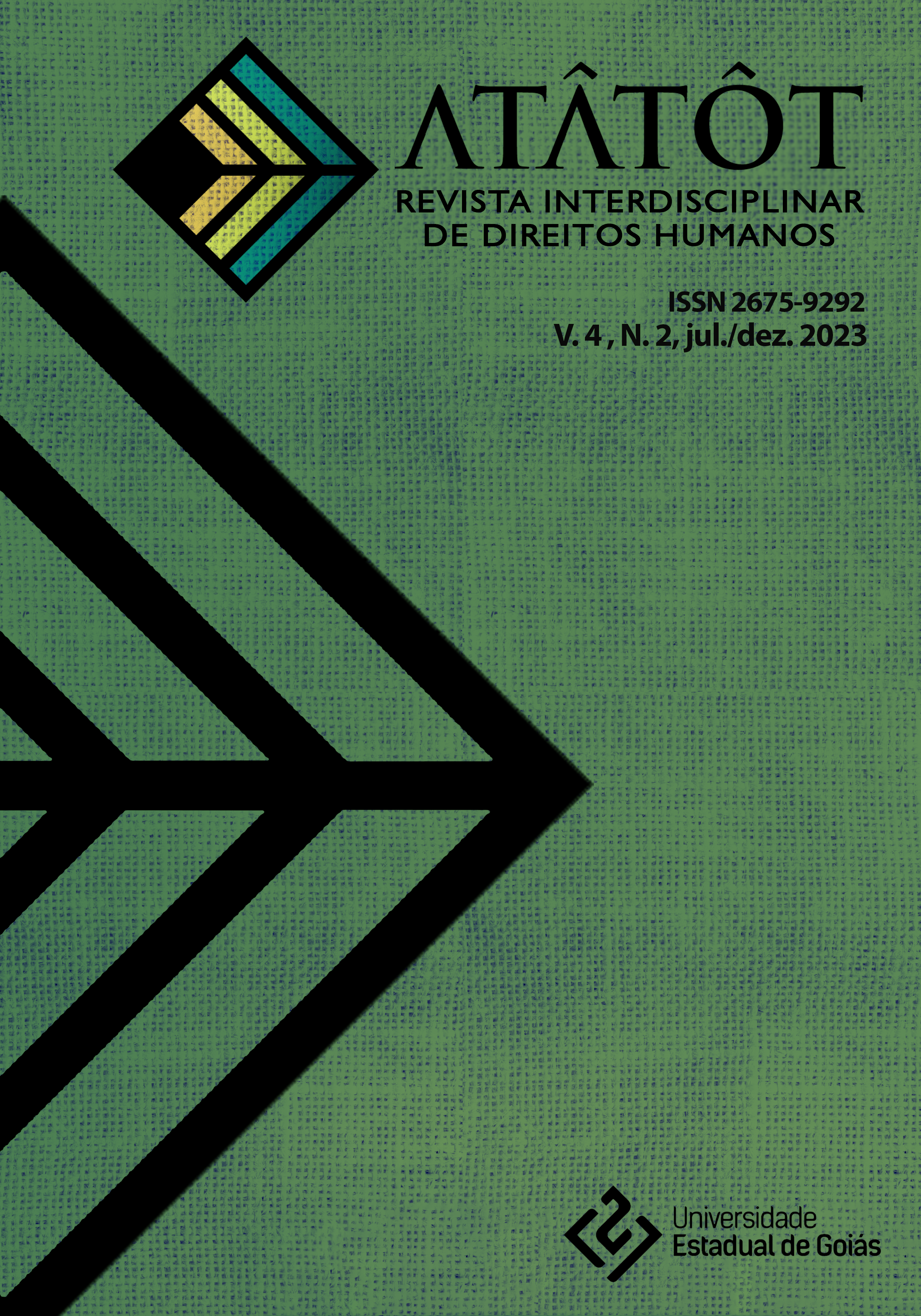
Dossier on Popular and Institutional Protection of Human Rights Defenders in Latin America
Vol. 4 No. 2 (2023)Atâtôt, the Interdisciplinary Journal of Human Rights of UEG, is a biannual academic publication under the responsibility of the State University of Goiás. Its aim is to create interdisciplinary spaces for the publication of articles, essays, reviews, and other academic texts on the general theme of human rights, focusing on topics related to democracy, constitutional issues, and social struggles for rights.
In the December 2023 edition, Atâtôt, the Interdisciplinary Journal of Human Rights from UEG, dedicates exclusive space to analyze the challenges and progress in the protection of human rights defenders in Latin America. In exploring popular and institutional strategies, our intention is to stimulate deep reflections on the preservation of these agents of change and strengthen protective networks, thereby contributing to the construction of fairer and more inclusive societies.
The first article "The Popular Protection of Human Rights Defenders: lessons learned in the Elma Novais case", by Luis Emmanuel Barbosa da Cunha, The Elma Novais case stands out as an emblematic example in the creation of a formal/institutional protection methodology for human rights defenders. At the turn of the millennium, while witnesses and children were already protected, defenders did not have adequate safeguards. The experience of popular protection was crucial, revealing how the State's initial approach to protecting Elma Novais was mistaken. The knowledge accumulated and systematized by the Seeds Project represents a historic mark of civil society.
The second article "Bolsonarism and the popular protection of human rights defenders in the Legal Amazon", by Marcelo Fontenelle e Silva, which addresses the relationship between Bolsonarism and the popular protection of human rights defenders in the Legal Amazon. Highlights the negative influence of Bolsonarism in human rights, analyzing electoral data that show their resilience. It concludes by emphasizing the importance of working in a network to protect human rights defenders.
The third article "Integral protection for human rights defenders and the role of Brazilian civil society", by Antonio Francisco de Lima Neto and Ana Claudia Taves, which addresses the protection of human rights defenders in a scenario of increasing violence. It examines a comprehensive perspective developed by civil society over the last 25 years, discussing actions to allow safer action for social movements and defenders. The fundamental role of popular movements and human rights organizations in protecting these individuals and their communities is highlighted. The text offers insights into strategies to address protection challenges in adverse contexts.
The fourth article "HUMAN RIGHTS PROTECTION Essay to suggest a popular, liberating and militant proposal", by Paulo César Carbonari, which proposes an innovative approach to the construction of human rights protection, focusing on popular, liberating and militant perspectives. Integration into processes stands out, popular organizations, with special attention to human rights defenders. The text covers context analysis, debate on vulnerability, assumptions and meaning of protective action, concluding with a summary of the meaning of popular protection.
The fifth article "PROTECTING HUMAN RIGHTS DEFENDERS IN BRAZIL A panoramic view of the existing popular and institutional protection experiences" by Ulisses Terto Neto and Caio Augusto Guimarães de Oliveira, highlights the limitation of advances in human rights in Brazil due to social authoritarianism, opening space for strengthening of the extreme right. Emphasizes that the country's return towards democracy and human rights depends on structural changes, with an essential focus on the role of human rights defenders. In light of the violence faced by these defenders, the document explores alternatives for their protection , analyzing existing experiences, and highlights the importance of the involvement of both civil society and the State.
-

2024 Edition
Vol. 5 No. 1 (2024)Interdisciplinary Journal of Human Rights is a publication of the State University of Goiás. The journal aims to publish original works by faculty and students from graduate programs in various fields related to human rights, both Brazilian and international. The aim is to disseminate scientific works and research results that address themes related to democracy, constitutional issues, and social struggles for human rights with an interdisciplinary approach. The publications are subject to blind peer review and publication standards.
-
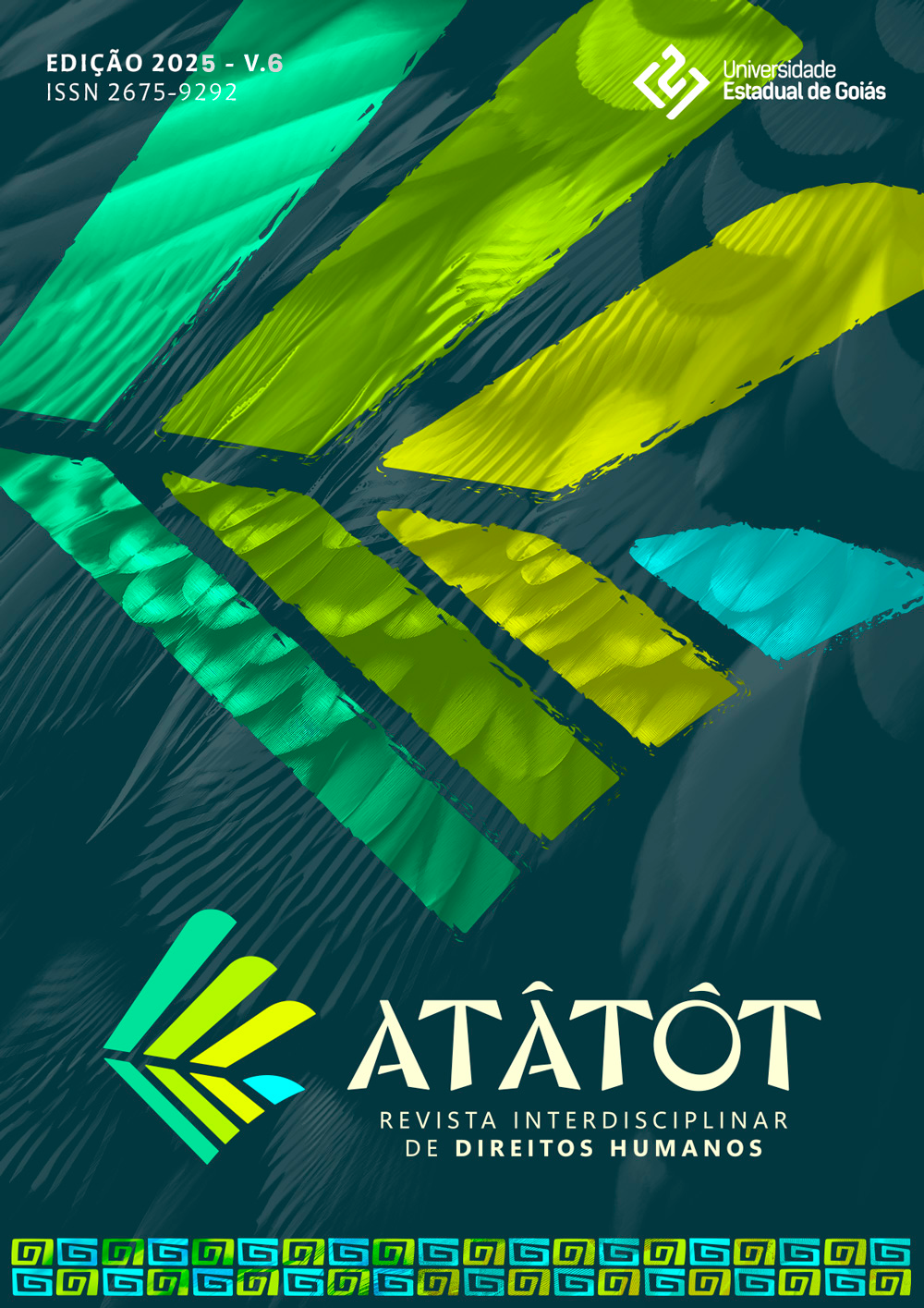
2025 Edition
Vol. 6 No. 1 (2025)Atâtôt – Interdisciplinary Journal of Human Rights of the UEG is an academic, open access, peer review publication of the Continuous Annual Publication of the State University of Goiás. Its objective is to open interdisciplinary spaces for the publication of articles, essays, reviews and other academic texts on the general theme of human rights, focusing on topics related to democracy, constitutional issues and social struggles for rights.





















